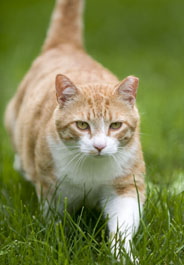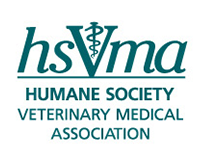| Advocacy |
Conference Brings Stakeholders Together for Science-Based Discussion on Outdoor Cats and WildlifeApril 16, 2013  The second HSISP Conference focused on outdoor cats and how to minimize their effect on wildlife. Michelle Riley/The HSUS The issue of outdoor cats and wildlife continues to be contentious with many veterinary professionals as well as members of the humane and conservation communities. In an effort to bring together diverse stakeholders and work toward the common goals of treating all animals humanely and reducing the impact of outdoor cats, HSVMA joined forces with The Humane Society of the United States and The Found Animals Foundation to host a recent conference on outdoor cat issues. The conference, entitled “The Outdoor Cat: Science and Policy from a Global Perspective,” was the second scientific, animal welfare-based program coordinated by the Humane Society Institute for Science and Policy. Approximately 150 cat and wildlife advocates attended the December event in Southern California, and speakers included veterinarians, ecologists, biologists, wildlife conservationists, lawyers, research scientists, and others from universities, research centers, non-profit organizations, and municipal and state agencies. They represented many decades of experience and diverse perspectives related to cats and wildlife. Veterinary speakers included Kate Hurley, DVM, MPVM, director of the Koret Shelter Medicine Program at UC Davis, and Julie Levy, DVM, Ph.D, from the Maddie’s Shelter Medicine Program at the University of Florida. Dr. Hurley discussed the welfare problems inherent in housing and euthanizing outdoor cats in shelters and provided evidence showing this has not been an effective strategy to reduce cat populations or to mitigate their impact on the environment. Dr. Levy reviewed different case studies of managing Florida cat colonies, and also discussed the future of fertility control including sterilization vaccinations. Other speakers discussed feral cat impacts on wildlife in the Hawaiian islands and collaborative efforts to protect both; efforts to reduce cat predation on birds in Portland, Ore.; free-roaming cat intervention in Maine; and a case study of cat colonies in Rhode Island. Ethics, legal issues, and cat behavior were also addressed. The two keynote speakers, David Macdonald, Ph.D. of Oxford University and Dennis Turner, Ph.D. of the University of Zurich, are internationally renowned for their work with cats. Read speaker presentations» Overall, speakers agreed that better science is necessary to inform the issue, but that the moral and social values related to it must also be considered. Applying techniques employed in human conflict resolution may help bring about more trust and understanding among cat and wildlife advocates. Several speakers and the organizers met after the conference to discuss next steps in carrying engagement forward. They agreed that, although the conflict at times may seem insurmountable, the cat problem deserves additional time and effort. The statement issued by this "post-conference" group is available online. Also available online is a white paper prepared for the conference that reviews published work on the complex issue of how outdoor cats affect wildlife. Note: The first HSISP conference, in 2011, was entitled, "Purebred Paradox," and focused on the welfare implications of dog breeding and disease risks in purebred dogs. Read more on this issue» |
